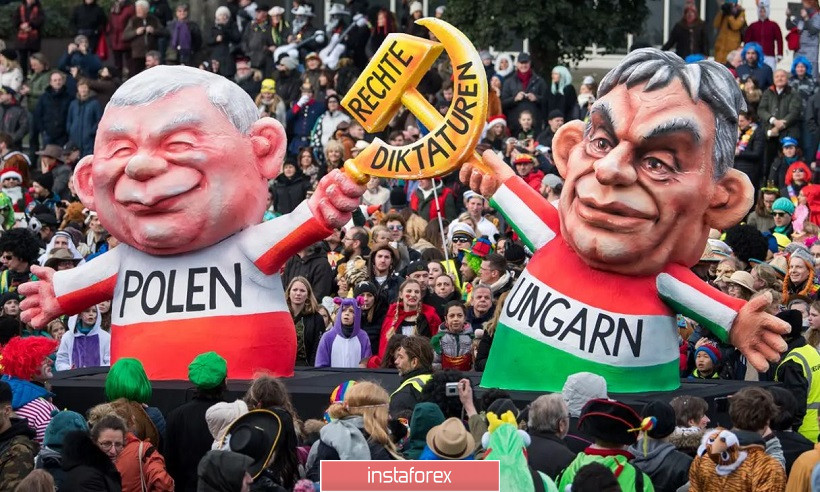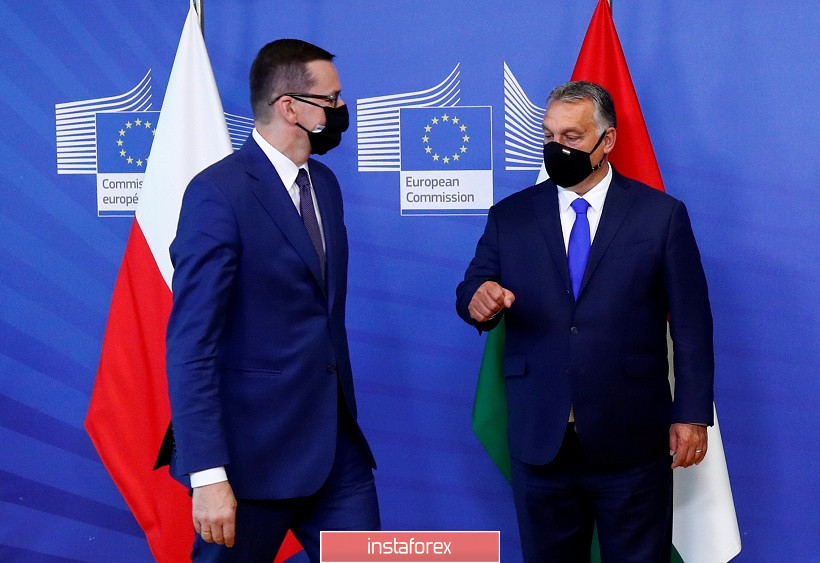The EUR/USD pair is at the crossroads: on the one hand, US dollar's weakening throughout the market and positive news regarding the creation of COVID-19 vaccine, while on the other, problems with the EU budget, whose implementation was suspended due to the position of the two EU countries. In such conditions, buyers of the pair cannot develop the upward trend in order to enter the level of 0.19 again. Moreover, traders of EUR/USD hold their positions only due to the USD weakness, while the EUR is currently unable to show character.
This week, representatives of the governments of the EU countries were supposed to ratify the agreements that were reached earlier in the European Parliament and this is not only about the EU budget of 1 trillion 100 billion euros. The 750-billion plan for the recovery of the European economy is also at risk. However, Hungary and Poland blocked the total package of 1.8 trillion euros, as both countries used their veto power.

The whole problem lies in the issue of the distribution of funds. It is assumed that the decisive criterion for the distribution of budget expenditures will be the observance of the rule of law by the EU countries. This was humbly received by Hungary and Poland, since it is these countries that most often fall under the barrage of criticism of human rights defenders. The Polish are often accused of tightening control over the media and the judiciary by the ruling party, while the Hungarians are accused of pursuing anti-immigrant policies: Hungary's ruling party, Fidesz, is conducting a massive campaign against immigrants, despite the fact that some more liberal European countries consider it a violation of the law, media freedom and minority rights. In the context of the new EU rules, this means that both countries could lose access to tens of billions of euros in EU funds.
Nevertheless, the regulatory procedures allow Warsaw and Budapest to block the process of adopting and implementing the budget, since no country of the Alliance will be able to receive money without unanimous consent. Actually, this lever of pressure was used by the "disgraced" states. The decision of Hungary and Poland means that the allocation of funds for the recovery of the European economy will be postponed.
It is noteworthy that when discussing the plan to rescue the economy, it was assumed that Brussels would automatically cut budget payments to it as soon as the European Commission caught a country of non-compliance with European values. However, Hungary threatened to block the approval of the European budget last summer. As a result, the EU's head proposed to significantly soften this mechanism, delaying the discussion of this issue. After lengthy negotiations, Budapest believed in the EU's leadership and supported the adoption of the budget and the economic rescue plan. In turn, Brussels did not keep its word – the relevant mechanisms were not relaxed. Due to this, the Hungarians blocked the process. They were joined by Polish who are under similar pressure from human rights organizations.
Most experts believe that EU members will eventually unblock the budget, but this will be preceded by many weeks of political negotiations (with the participation of Germany and France), as a result of which the Poles and Hungarians will bring down certain guarantees for themselves. For the current uncertainty period, it puts some pressure on the Euro, and so it will not be able to go to the 19th value together with the US dollar.

In turn, Brexit also has an indirect impact on the EUR/USD pair. And although in this case the pound is at the forefront of the attack, the euro still reacts to possible changes in trade negotiations. Recently, rumors around Brexit have been extremely controversial: according to some sources, the parties are on the verge of complete failure, while according to information from other agencies, a trade deal will be agreed upon in just a few days. Against the background of such a wide range of possible scenarios, the euro also cannot find a pivot. As a result, it has to focus on the quoted currency, that is, on the US currency.
Nevertheless, the EUR/USD pair has not worned out its upside potential. Several experts believe that the EU budget will be unblocked in just a few weeks following the political negotiations with Angela Merkel. Therefore, the euro relatively calmly took the negative news from Brussels, only slowing down its growth. Meanwhile, the US currency is now actively losing its positions, amid a decline in anti-risk sentiment and, accordingly, an increased interest in risky assets. All this suggests that any more or less large-scale price downturn of the EUR/USD pair can be considered as a reason to open long positions. The main goal for growth in the medium term is the level of 1.1950, which is the upper line of the Bollinger Bands indicator on the daily time frame.





















